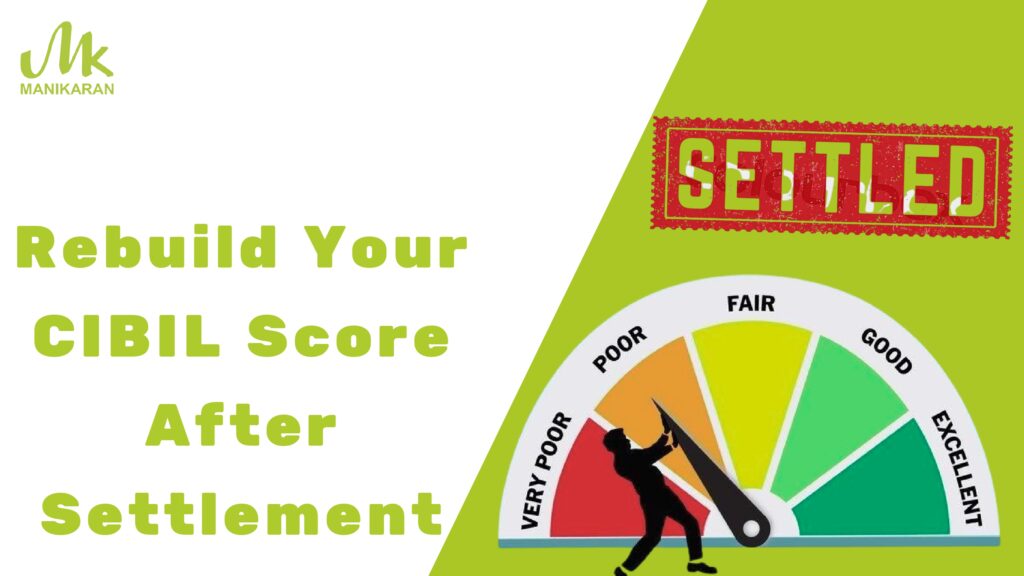How to Rebuild Your CIBIL Score After Settlement

A good credit score is essential to your financial well-being. It reflects your creditworthiness and plays an important role in your ability to obtain loans, credit cards, or better terms of finance. In India, one of the most widely accepted credit scores among banks and lenders is the CIBIL score, which is a three-digit number between 300 and 900.
Nevertheless, if you had already chosen to settle a loan in the past, you will be aware of a sudden decline in your CIBIL score. A loan settlement, while providing instant relief, creates a long-term negative entry on your credit report. The silver lining is that such an entry is not permanent in nature.
In this article, we’ll provide a detailed, step-by-step guide on how to rebuild your CIBIL score after a loan settlement and regain your financial credibility.
What Is Loan Settlement and Why Does It Impact Your CIBIL Score?
Loan settlement is when the borrower cannot pay the full loan amount and agrees to settle a smaller amount as a one-time settlement with the lender. Though this will help avoid legal proceedings in the short run, the lender logs the account as “settled” in your CIBIL report rather than “closed.”
This “settled” status is considered negatively by banks and lowers your CIBIL score considerably—usually between 75 and 150 points. It reflects a history of failure to make full repayment, which can deter subsequent lenders from sanctioning new credit requests.
Why It’s Crucial to Rebuild Your CIBIL Score
Having a low CIBIL score restricts your finance options. It can lead to:
Loan and credit card applications being rejected
Increased interest rates
Lower loan amounts or credit limits
Requests for more guarantors or collateral
Hence, rebuilding your credit history is necessary in order to enhance your financial credibility and credit access.
Step-by-Step Guide to Rebuild Your CIBIL Score After Settlement
1.Pay Off Any Outstanding Amount, If Possible
If you can afford it, contact your lender and ask if they can change the status from “settled” to “closed” once you pay the outstanding dues in full. A “closed” status indicates a loan repayment has been made and will have a positive impact on your credit score.
Tip: Always obtain a No Dues Certificate and written intimation from the lender whenever any payment is made.
2. Obtain and Check Your CIBIL Report
Begin by downloading your CIBIL report from the authentic CIBIL website. Reading your credit report enables you to:
Identify any erroneous or old entries
Check if the “settled” status is correctly reported
Identify any pending payments or credit mistakes
If you notice discrepancies, you can file a grievance with CIBIL to have them corrected.
3. Pay All Existing Credit Accounts on Time
Paying your EMIs and credit card dues on or before the due date regularly is one of the best methods of raising your CIBIL score. Payment history carries the maximum weightage (35%) in determining your score.
Master Tip: Place auto-debit instructions or reminders to forget about missing due dates.
4. Keep a Low Credit Utilization Ratio
Your credit utilization ratio is the percentage of your credit limit that you’re using. Ideally, it should be kept below 30%.
For example, if your total credit limit is ₹1,00,000, your total monthly usage should not exceed ₹30,000.
High utilization signals credit dependency and may lower your score. Keeping balances low and repaying frequently reflects healthy credit behaviour.
5. Refrain from Multiple Loan or Credit Card Applications
Each time you apply for a credit card or loan, lenders pull your credit report, resulting in a hard inquiry. Excessive inquiries within a short time frame signal financial difficulties and decrease your credit score further.
Rather, wait until your credit profile is strong and only apply when there is a need.
6. Opt for a Secured Credit Card
If you’re unable to get approved for a regular credit card, opt for a secured credit card backed by a fixed deposit. These cards are easier to obtain and can be used to:
Build a new credit history
Prove your ability to manage credit responsibly
Improve your score through regular payments
7. Diversify Your Credit Mix
Lenders like borrowers who have a diversified credit portfolio—a good mix of secured loans (such as home or car loans) and unsecured loans (such as credit cards or personal loans). Diversifying the types of credit you have, done responsibly, can contribute to a higher credit score in the long run.
8. Work With a Credit Counselor or Financial Advisor
If debt management or score rebuilding seems daunting, think about seeing a certified credit counselor. They can:
Assist you in the development of a realistic repayment plan Negotiate with your creditors for you Lead you through credit repair techniques.
9. Do Not Close Old Credit Accounts
Your credit age also affects your credit score. Keep your old accounts open even if they are not used frequently, as they contribute positively to your credit profile.
Closing old accounts can lower your total credit limit and affect your credit utilization ratio.
10. Check Your Credit Score Regularly
Restoring your CIBIL score is a process that takes time. Monitor your improvement by reviewing your score every 3 to 6 months. You can track your report through:
CIBIL’s official website
Free credit report portals by banks or financial apps
Monitoring keeps you alert and able to identify any suspicious changes or errors early on.
How Long Does It Take to Rebuild a CIBIL Score?
There is no exact time frame, but with regular effort, you might start noticing improvements in your score between 6 to 12 months. Substantial improvement—particularly after settling a loan—can take as much as 18 to 24 months, based on your spending and repayment habits.
Final Thoughts
Restoring your CIBIL score after settlement is difficult but certainly achievable. It demands discipline, patience, and persistent effort. Begin by rectifying any mistakes in your report, practice responsible credit behavior, and stay away from future defaults.
Your CIBIL score is not a figure—it is your financial identity. Doing the right thing today can get you a better deal on money tomorrow.

